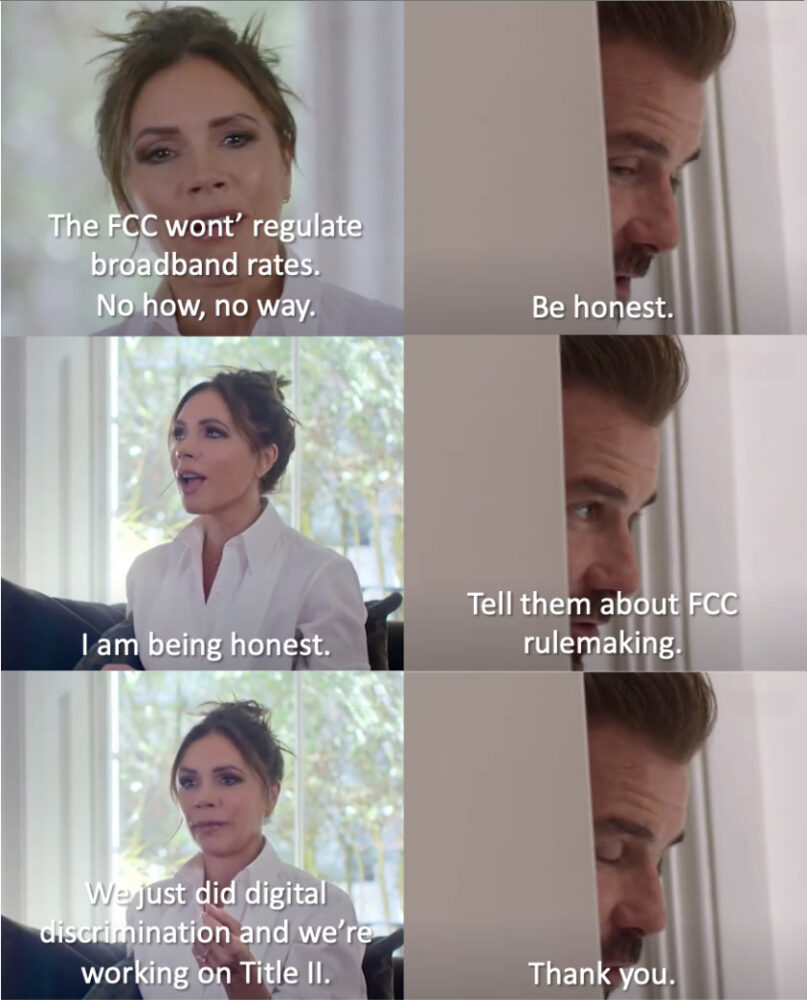
Betteridge’s Law of Headlines states: “Any headline that ends in a question mark can be answered by the word no.” But, apparently, folks in the nation’s capital found a way around Betteridge’s Law.
This week, a U.S. House subcommittee hearing featured testimony from all five members of the Federal Communications Commission (FCC). The majority on the House Energy and Commerce Subcommittee on Communications and Technology did away with the question mark, titling the hearing “Oversight of President Biden’s Broadband Takeover.”
While it might be a stretch to call the administration’s broadband-policy agenda a “takeover,” one can be forgiven for concluding that the FCC is moving forward with so many massive and comprehensive interventions in nearly every aspect of the broadband market that it looks a lot like a takeover.
The agency’s newly enacted digital-discrimination rules cover any entity even remotely involved in the deployment and delivery of broadband, and cover just about any activity involved in deployment and delivery. The FCC’s full-steam-ahead drive to impose Title II common-carrier obligations on broadband will involve similarly massive and comprehensive interventions. On top of those policies, the FCC is also considering regulating broadband data caps and fees for early termination of broadband subscriptions.

Written testimony submitted by the commissioners reveal deep divisions among the FCC. Republican Commissioner Brendan Carr accused the administration of choosing “partisan ideology over smart policy” to increase government control. Democratic Chair Jessica Rosenworcel defended the FCC’s actions as necessary to ensure “every consumer” has “fast, open, and fair” broadband access.
“The theme running through the Biden administration’s internet policies is not one of connectivity or capacity—it is control,” Carr said, highlighting the administration’s support for bringing back Title II utility-style regulations on broadband, including net-neutrality rules. Carr argued that these amount to outdated and sweeping government controls.
In contrast, Rosenworcel argued that the FCC is working to “keep pace with the rapidly evolving communications landscape and bring high-speed connectivity to everyone.”
During the hearing, Energy and Commerce Committee Committee Chair Cathy McMorris Rodgers (R-Wash.) took issue with the FCC’s sweeping digital-discrimination rules:
I’m equally concerned about the agency’s new so-called digital discrimination rules. The FCC went far beyond its congressional mandate by adopting far-reaching rules that could result in the agency micromanaging basic business decisions made by providers like prices, contract terms, even marketing campaigns and regulating industries outside of its jurisdiction including landlords and banks. … The IIJA does not give the FCC authority to regulate these practices or industries. Where did the FCC find this authority and what expertise does the FCC even have to regulate these practices?
Rosenworcel responded that Congress gave the FCC “a very broad mandate” to “prevent and eliminate digital discrimination,” and that this “exceptionally broad” mandate was not limited to just “some internet providers” and “certain terms and conditions.”
Carr noted that both the Title II rules and the digital-discrimination rules allow for rate regulation. Rosenworcel herself has in the past been adamant that the FCC has no intention to regulate broadband rates (“Nope. No how, no way”), although her written testimony for this hearing was notably silent on the topic of rate regulation. When asked by McMorris Rogers whether the FCC would use digital-discrimination rules to regulate rates, Rosenworcel responded: “No, actually in the text of it, we make clear there will be no rate regulation.”
Technically, Rosenworcel is correct. The agency’s digital-discrimination rules do not regulate rates. Instead, the rules set up a complaint process through which claimants can allege discrimination in pricing, with the FCC acting as judge and jury in the proceeding. So, while the digital-discrimination rules do not provide for ex ante rate regulation, the FCC gave itself authority to impose ex post rate regulation in the name of eliminating digital discrimination.
In comments submitted to the FCC, the U.S. Chamber of Commerce summarized the consequences of the agency’s ex post approach:
These policies would render it impossible for businesses and the marketplace to make rational investment decisions. The scope of the services that the Draft covers is so broad that it does not provide meaningful guidance for how to comply. And because the Draft fails to grant sufficient guidance, it does not give fair notice of how to avoid liability. Consequently, investment in broadband innovation would disappear and consumers would have to pay higher costs for less efficient services.
Let’s take the chair at her word that, so long as she’s chair, the FCC will not engage in rate regulation. Alas, she won’t be chair forever. Under current rules, there’s little to stop a future FCC from imposing rate regulation, either through Title II or via enforcement of the agency’s digital-discrimination rules.
This is not a new concern. When the FCC imposed Title II regulation in 2015, then-Commissioner Ajit Pai noted in his dissent that forbearance from rate regulation merely meant that “the FCC will not impose rules ‘for now.’”
Despite disagreement among Democratic and Republican commissioners on Title II and digital discrimination, their written testimony was unanimous in asking Congress to restore the FCC’s spectrum-auction authority.
For his part, Carr chastised the administration for focusing so much on “command and control” broadband policies, rather than spectrum. He criticized the recently released National Spectrum Strategy as a “spectrumless spectrum plan,” adding that: “After nearly three years of study, the administration’s spectrum plan commits to freeing up exactly zero MHz of spectrum. That is not a typo.”
So, has the Biden administration taken over broadband? Under Betteridge’s Law, the answer is no—but that’s only because the takeover isn’t yet complete.




